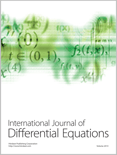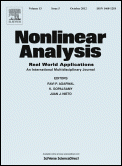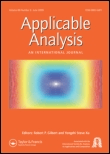
Evolution Equations and Control Theory
Scope & Guideline
Transforming Theoretical Advances into Practical Applications.
Introduction
Aims and Scopes
- Control Theory:
The journal extensively covers various aspects of control theory, including controllability, observability, and stabilization of systems described by evolution equations. It emphasizes both theoretical advancements and practical applications. - Evolution Equations:
Research on evolution equations, such as parabolic, hyperbolic, and delay differential equations, is a core focus. This includes studies on existence, uniqueness, and regularity of solutions. - Numerical Analysis and Simulation:
The journal publishes studies that involve numerical methods for solving complex evolution equations and control problems, highlighting computational techniques and simulations. - Stability Analysis:
A significant portion of the research is dedicated to the stability analysis of various systems, including asymptotic stability, exponential stability, and robustness of solutions under perturbations. - Fractional Differential Equations:
The journal includes a growing body of work on fractional differential equations, exploring their applications in control theory and dynamic systems. - Nonlinear Dynamics:
Research on nonlinear evolution equations and their dynamics is a prominent theme, focusing on phenomena such as blow-up, bifurcations, and chaotic behaviors.
Trending and Emerging
- Fractional Control Theory:
There is an increasing focus on fractional calculus and its applications in control theory, particularly regarding fractional differential equations and their implications for system dynamics. - Stochastic Systems:
Emerging research in stochastic control problems and stochastic differential equations showcases a growing interest in uncertainty modeling and its effects on system behavior. - Multi-Scale and Networked Systems:
Recent papers emphasize the analysis and control of multi-scale systems and networked dynamics, reflecting the complexity of real-world phenomena that require consideration of interconnections and multi-dimensional interactions. - Data-Driven and Machine Learning Approaches:
Innovative research incorporating data-driven methodologies and machine learning techniques into control theory is gaining traction, highlighting new ways to approach traditional problems. - Bio-Mathematical Models:
There is a notable trend towards the application of evolution equations in biological modeling, particularly in epidemiology and population dynamics, reflecting the relevance of these models in current global challenges.
Declining or Waning
- Classical Control Theory:
There appears to be a diminishing emphasis on classical control techniques that do not incorporate modern mathematical frameworks or computational approaches, reflecting a shift towards more innovative and complex methods. - Single-Domain Systems:
Research focusing solely on single-domain systems (e.g., one-dimensional problems) is becoming less prevalent as attention shifts to multi-dimensional and networked systems that better reflect real-world applications. - Static Models:
There is a notable decrease in studies that apply static models without considering dynamic behaviors or time-dependent phenomena, as the field increasingly recognizes the importance of time evolution in modeling.
Similar Journals

APPLIED MATHEMATICS AND OPTIMIZATION
Catalyzing Advancements in Applied Mathematics and OptimizationApplied Mathematics and Optimization, published by Springer, is a prestigious journal dedicated to the rigorous exploration of applied mathematics, optimization techniques, and their multifaceted applications. Since its inception in 1974, the journal has maintained a robust reputation within the academic community, achieving a commendable Q1 ranking in both Applied Mathematics and Control and Optimization categories as of 2023. With an impact factor that underscores its influence in the field, the journal provides a platform for researchers and practitioners to disseminate innovative methodologies and significant advancements. While it does not offer Open Access, the journal’s esteemed peer-reviewed articles serve as invaluable resources for the advancement of theoretical knowledge and practical applications. Researchers, professionals, and students alike will find Applied Mathematics and Optimization an essential source for staying at the forefront of mathematical sciences, particularly in optimizing real-world systems and processes.

Afrika Matematika
Advancing mathematical frontiers in Africa and beyond.Afrika Matematika is a prominent academic journal published by SPRINGER HEIDELBERG, dedicated to advancing research in the field of mathematics. With an ISSN of 1012-9405 and E-ISSN of 2190-7668, the journal has earned recognition for its contributions to diverse areas within mathematics, particularly through its designation in the Q3 quartile of the 2023 mathematics category and ranking 113 out of 399 in general mathematics on Scopus, reflecting a commendable 71st percentile standing. Covering a wide array of topics, the journal serves as an essential platform for researchers, professionals, and students engaged in mathematical studies and practical applications. Although not open access, Afrika Matematika maintains a rigorous peer-review process to ensure the high quality and relevance of its published articles, which are pivotal in shaping the mathematical landscape in Africa and beyond. With a convergence of scholarly work spanning from 2011 to 2024, this journal underscores its commitment to fostering a vibrant academic community that inspires innovation and collaboration in mathematical research.

Journal of Elliptic and Parabolic Equations
Unveiling New Dimensions in Mathematical EquationsWelcome to the Journal of Elliptic and Parabolic Equations, a prominent publication dedicated to advancing the field of mathematical analysis, particularly focusing on elliptic and parabolic PDEs. Published by Springer Heidelberg, this journal stands out with its commitment to quality research, as evidenced by its classification in the Q2 quartile for Analysis, Applied Mathematics, and Numerical Analysis fields in 2023. Spanning from 2015 to 2024, the journal not only showcases cutting-edge findings but also provides a platform for discussions on innovative methodologies and applications relevant to both theoretical and practical aspects of mathematics. Researchers, professionals, and students are encouraged to explore this journal for insightful articles that push the boundaries of knowledge in mathematical equations and their applications, enriching the academic community and fostering further exploration in the discipline.

JOURNAL OF MATHEMATICAL ANALYSIS AND APPLICATIONS
Exploring the Frontiers of Mathematical AnalysisThe JOURNAL OF MATHEMATICAL ANALYSIS AND APPLICATIONS, published by Academic Press Inc Elsevier Science, represents a leading platform in the fields of mathematical analysis and applied mathematics. With its esteemed Q1 ranking in Analysis and Q2 in Applied Mathematics, this journal plays a vital role in disseminating high-quality research that addresses complex mathematical problems and their applications in various scientific domains. Covering a broad spectrum of topics, the journal has been a cornerstone of mathematical scholarship since its inception in 1960 and continues to thrive with contributions from prominent researchers across the globe, expected to extend through 2025. The journal is indexed in Scopus, currently ranking #60 out of 193 in Mathematics Analysis and #281 out of 635 in Applied Mathematics, reflecting its significant impact in the academic community. Although it does not offer open access options, researchers and professionals are encouraged to subscribe to access cutting-edge findings and insights. As an essential resource, the journal fosters the advancement of mathematical theories and their practical applications, making it indispensable for mathematicians, academics, and industry professionals alike.

International Journal of Differential Equations
Pioneering Discoveries in Applied MathematicsThe International Journal of Differential Equations is a premier platform for scholars and practitioners in the field of mathematics, dedicated to advancing the study of differential equations and their extensive applications. Published by Hindawi Ltd, this open access journal, which has been available since 2010, aims to bridge the gap in research by providing a venue for significant findings, innovative methodologies, and impactful applications. Operating under rigorous peer-review standards, it holds a Q3 ranking in both Analysis and Applied Mathematics for 2023, demonstrating its growing influence within these domains. With a clear focus on fostering interdisciplinary research, the journal invites contributions that explore theoretical advancements as well as practical implementations of differential equations. By making high-quality research freely accessible, the International Journal of Differential Equations plays a crucial role in empowering academics and industry professionals alike, enhancing collaboration and knowledge-sharing in this vital area of mathematical science.

Trudy Instituta Matematiki i Mekhaniki UrO RAN
Pioneering Research in Computational Mechanics and MathematicsTrudy Instituta Matematiki i Mekhaniki UrO RAN, a prestigious journal published by the KRASOVSKII INST MATHEMATICS & MECHANICS URAL BRANCH RUSSIAN ACAD SCIENCES, serves as a vital platform for the dissemination of research in the diverse fields of applied mathematics, computational mechanics, and computer science applications. With a dedicated focus on advancing theoretical and practical applications within these disciplines, the journal emphasizes innovative methodologies and novel concepts that are crucial in an era where mathematical techniques are increasingly intertwined with emerging technologies. Although currently not an open-access publication, the journal caters to a niche yet expansive audience of researchers, academics, and professionals, providing insights into current trends and breakthroughs. Notably, it holds a commendable position in various quartiles — Q3 in Applied Mathematics and Q2 in Computational Mechanics as of 2023, reflecting its growing influence within the scientific community. While its Scopus rankings indicate a competitive landscape, this journal continues to be a significant resource for scholarly discourse, making substantial contributions to the body of knowledge for its readers based in the Russian Federation and beyond.

Electronic Journal of Qualitative Theory of Differential Equations
Pioneering Open Access Scholarship in Differential EquationsThe Electronic Journal of Qualitative Theory of Differential Equations, published by the esteemed UNIV SZEGED's BOLYAI INSTITUTE in Hungary, is a prominent platform in the realm of applied mathematics, recognized for its rich contributions to the field since its inception in 1998. With an ISSN of 1417-3875 and open access format, the journal ensures that cutting-edge research is accessible to a global audience, fostering collaboration and knowledge exchange among researchers, professionals, and students alike. It holds a commendable Q2 ranking in Applied Mathematics, reflecting its commitment to high-quality scholarship, and maintains a respectable Scopus rank, positioned at #432 out of 635. Covering a wide spectrum of qualitative theories related to differential equations, the journal guides its readers through the complexities of mathematical theories and applications, making it an essential resource for anyone looking to deepen their understanding in this vital area of study. The journal's focus on innovative and interdisciplinary approaches ensures that it remains at the forefront of mathematical research, ultimately contributing to advancements in the field.

Advances in Differential Equations and Control Processes
Exploring the Frontiers of Mathematics and EngineeringAdvances in Differential Equations and Control Processes, published by PUSHPA PUBLISHING HOUSE, is a leading journal dedicated to the exploration and advancement of differential equations and control processes, critical areas of study within applied mathematics and engineering. With its ISSN 0974-3243, this journal offers a platform for researchers, practitioners, and students to publish and disseminate innovative findings, methodologies, and applications. Although currently not listed as open access, the journal invites submissions that contribute to the theoretical and practical aspects of differential equations, showcasing significant advancements in both fields. By fostering a rigorous peer-review process, it aims to maintain high standards of publication quality, thus holding a vital place in the academic landscape. The journal also serves as a valuable resource for those interested in the intersection of mathematics, physics, and engineering, encouraging collaboration and dialogue among scholars across disciplines. Discover the latest research and developments that drive the future of differential equations by exploring the rich content this journal has to offer.

NONLINEAR ANALYSIS-REAL WORLD APPLICATIONS
Transforming Theory into Real-World SolutionsNONLINEAR ANALYSIS-REAL WORLD APPLICATIONS, published by PERGAMON-ELSEVIER SCIENCE LTD, is a premier academic journal dedicated to advancing the field of nonlinear analysis through rigorous research and practical applications. With an impressive impact factor and categorized in the Q1 quartile across multiple disciplines including applied mathematics, computational mathematics, and engineering, this journal stands as a vital resource for researchers, professionals, and students. Its extensive scope encompasses significant contributions from the domains of economics, medicine, and various engineering fields, making it a leading platform for interdisciplinary exchange. The journal's commitment to showcasing innovative methodologies and solutions from 2000 to 2025 not only enhances its academic prestige but also fosters real-world impact, thus catering to a diverse scholarly audience eager to explore the complexities and potentials of nonlinear phenomena. Access options vary, ensuring a wide dissemination of knowledge to drive future discoveries in this dynamic area of study.

APPLICABLE ANALYSIS
Exploring innovative pathways in analysis.APPLICABLE ANALYSIS, published by Taylor & Francis Ltd, is an esteemed journal dedicated to advancing research in the fields of analysis and applied mathematics. With its ISSN 0003-6811 and E-ISSN 1563-504X, the journal has been a cornerstone of scholarly communication since its inception in 1971, with a convergence of content projected until 2024. Belonging to the Q2 category for both Analysis and Applied Mathematics as of 2023, it ranks impressively at #58 out of 193 in the field of Mathematics Analysis and #274 out of 635 in Mathematics Applied Mathematics as per Scopus metrics. Although the journal currently does not offer Open Access, it continues to provide valuable insights and cutting-edge research that is vital for academics, professionals, and students who seek to deepen their understanding and application of analytical techniques in various contexts. Its commitment to high-quality research plays a significant role in shaping the landscape of modern mathematics.